The Beginner Group from the Nepali Newsroom explains the reasons behind the recent Gen Z-led protests in Nepal
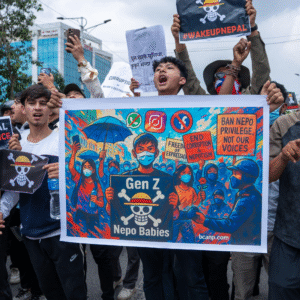
Gen Z protesters demonstrating against nepotism, Kathmandu, Nepal, 9 September 2025.
Picture by: Rojen Maharjan | Alamy
Article link copied.
October 24, 2025
Gen Z protests in Nepal: Reasons behind the uprising
The protests in Nepal in early September, which resulted in more than 70 deaths and led to the downfall of the prime minister KP Sharma Oli, were a response to several issues that have affected the country for years, and especially the Gen Z population.
The biggest problem is corruption, which has long been rampant in the political and bureaucratic system of Nepal and has caused growing anger and frustration among the public.
Members of the Gen Z generation even launched an online campaign against corruption. It was widely shared across numerous social media platforms, including Discord, Facebook, Instagram, Reddit and TikTok.
Harbingers’ Weekly Brief
The Commission for the Investigation of Abuse of Authority (CIAA), a government body that is supposed to investigate and stop corruption in Nepal, has also been mired in controversy due to political appointments.
Nepotism is another major problem and source of resentment in Nepal. There has been a backlash against people known as “nepo babies” or “nepo kids”. “This is not fair because people do the hard work, but the politicians and their daughters and sons get the benefits,” said Krishna Manandhar, 25.
Finally, there is a long-standing unemployment – and underemployment – crisis. The country’s economy relies heavily on remittances from Nepalese working overseas because of the lack of jobs within the country, especially for young people.
However, the tipping point for the protest was a banon 26 social media apps, including WhatsApp, Facebook and Instagram.
The apps were given a seven-day deadline to register with the government or be banned if they did not comply. TikTok, Viber and a few other apps did register and therefore were not banned.
The restrictions on social media prevented people from using these tools for communication or even to share their frustration. People weren’t able to contact their loved ones who lived overseas.
Subsequently, Gen Z announced a protest on 8 September against widespread corruption and the social media ban.
On 7 September, Puroshotam Yadav, a Gen Z youth leader, was given official permission by the Kathmandu District Administrative Office to hold the protest.
“Nepal has many wonderful people who are kind and hard-working. They want to live in a country where everyone is treated fairly,” Yadav told Harbingers’ Magazine. “We want the government to listen to our concerns and work to make Nepal a better place for everyone.”
During the demonstration, some protesters told Harbingers’ Magazine that they just wanted the government to correct its course. “Our future is being hijacked in this country,” said a group of high school students. “We have already planned to leave this country after high school.”
The demonstrators gathered peacefully in Kathmandu on 8 September. They could be seen dancing, chanting slogans and carrying placards against nepo babies and corruption.
However, the protest turned violent as police relentlessly attacked the young people agitating against corruption. The casualties included 19 killings on the day, spiking to a total of 76 with more than 2,100 injured.
Written by:
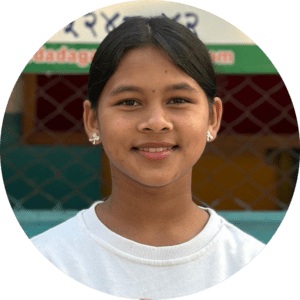
Contributor
Kathmandu, Nepal
Born in 2012 in Surkhet, Kalpana studies in Kathmandu, Nepal. She is interested in writing, technology and drawing, and plans to study journalism. She is part of our Nepali Newsroom’sBeginner group and writes about culture.
In her free time, Kalpana also enjoys dancing. She has won several awards in school competitions, including poetry recitals and quizzes.
Kalpana speaks Nepali, English and Hindi.
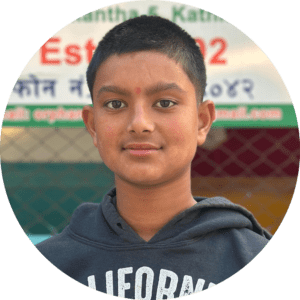
Contributor
Kathmandu, Nepal
Born in 2012 in Bajura, Laxman studies in Kathmandu, Nepal. He is interested in journalism, football and drawing, and plans to study journalism. He is part of our Nepali Newsroom’sBeginner group and writes about society.
In his free time, Laxman enjoys reading and writing, and he has won several awards in drawing and writing competitions in school.
Laxman speaks Nepali, English and Hindi.
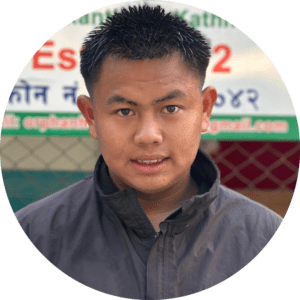
Contributor
Kathmandu, Nepal
Born in 2005 in Sindhuli, Om studies in Kathmandu, Nepal. He is interested in drawing and writing, and plans to study hotel management. He is part of our Nepali Newsroom’sBeginner group and writes about society. In his free time, he enjoys football, basketball and writing. He has also won awards in school including quiz competitions.
Om speaks Nepali and English.
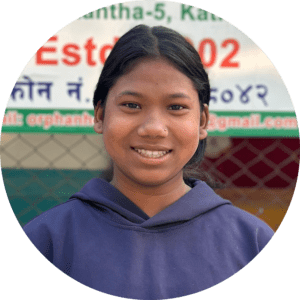
Contributor
Kathmandu, Nepal
Born in 2012 in Kailali, Pratima studies in Kathmandu, Nepal. She is interested in dancing, singing and writing, and plans to study computer science. She is part of our Nepali Newsroom’s Beginner group and writes about human rights.
Pratima speaks Tharu, Nepali, English and Hindi.
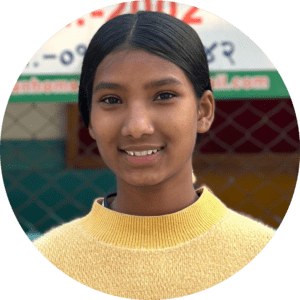
Contributor
Kathmandu, Nepal
Born in 2011 in Bajura, Ramita studies in Kathmandu, Nepal. She is interested in singing, dancing, reading and writing, and plans to study medical science. She is part of our Nepali Newsroom’s Beginner group and writes about science.
In her free time, Ramita enjoys playing football. She has also won awards in school competitions, including quizzes.
Ramita speaks Nepali, Dangali, English and Hindi.
Edited by:
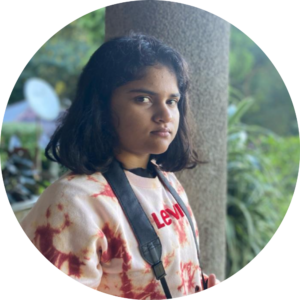
🌍 Join the World's Youngest Newsroom—Create a Free Account
Sign up to save your favourite articles, get personalised recommendations, and stay informed about stories that Gen Z worldwide actually care about. Plus, subscribe to our newsletter for the latest stories delivered straight to your inbox. 📲
© 2025 The Oxford School for the Future of Journalism


